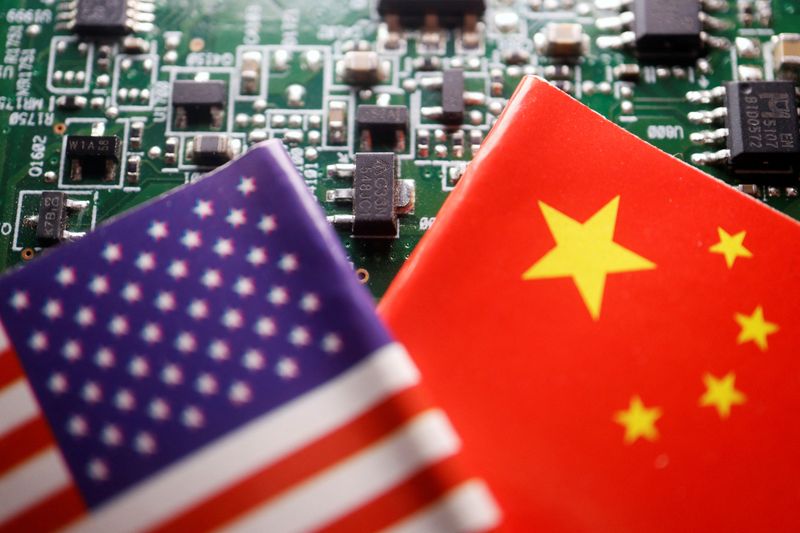By Stephen Nellis
SAN FRANCISCO (Reuters) -U.S. lawmakers are calling for broader bans on chipmaking equipment to China after a bipartisan investigation found that Chinese chipmakers had purchased $38 billion of sophisticated gear last year.
Inconsistencies in rules issued by the United States, Japan and the Netherlands have led to non-U.S. chip equipment manufacturers selling to some Chinese firms that U.S. companies could not, according to a report published on Tuesday by the U.S. House of Representatives Select Committee on China.
The committee called for broader bans by the U.S. and its allies on chipmaking tool sales to China, rather than narrower bans on sales to specific Chinese chipmakers.
The $38 billion was purchased from five top semiconductor manufacturing equipment suppliers, without breaking the law, a 66% increase from 2022, when many of the tool export restrictions were introduced.
That accounted for nearly 39% of the aggregate sales of Applied Materials, Lam Research, KLA, ASML and Tokyo Electron, the report found.
“These are the sales that made China increasingly competitive in the manufacture of a wide range of semiconductors, with profound implications for human rights and democratic values around the world,” the report said.
Both U.S. Democratic and Republican administrations have sought to restrict China’s ability to make microchips – crucial to fields such as artificial intelligence and military modernization. The two economic superpowers are also vying to sell advanced technology such as AI data centers to other nations.
Mark Dougherty, president of Tokyo Electron’s U.S. unit, said the industry’s China sales have started to decline this year, in part due to new regulations and welcomed more coordination between the U.S. and Japanese governments.
“I think it’s clear, from a U.S. perspective, there’s an outcome that is still desired that has not yet been achieved,” Dougherty told Reuters in an interview.
ASML and KLA declined to comment. Applied Materials and Lam Research did not respond to a request for comment.
The committee said the toolmakers cooperated with the committee on the report and were informed of its findings.
Three Chinese firms that have become major customers of toolmakers – SwaySure Technology Co, Shenzhen Pengxinxu Technology Co and SiEn (Qingdao) Integrated Circuits Co – are of particular security concern.
They were flagged last year by the congressional committee’s leaders, Chairman John Moolenaar, a Michigan Republican, and Ranking Member Raja Krishnamoorthi, an Illinois Democrat, in a letter to the Commerce Department alleging ties to a secret network aiding Huawei Technologies, and U.S. officials barred exports to them in December.
By Stephen Nellis
SAN FRANCISCO (Reuters) -U.S. lawmakers are calling for broader bans on chipmaking equipment to China after a bipartisan investigation found that Chinese chipmakers had purchased $38 billion of sophisticated gear last year.
Inconsistencies in rules issued by the United States, Japan and the Netherlands have led to non-U.S. chip equipment manufacturers selling to some Chinese firms that U.S. companies could not, according to a report published on Tuesday by the U.S. House of Representatives Select Committee on China.
The committee called for broader bans by the U.S. and its allies on chipmaking tool sales to China, rather than narrower bans on sales to specific Chinese chipmakers.
The $38 billion was purchased from five top semiconductor manufacturing equipment suppliers, without breaking the law, a 66% increase from 2022, when many of the tool export restrictions were introduced.
That accounted for nearly 39% of the aggregate sales of Applied Materials, Lam Research, KLA, ASML and Tokyo Electron, the report found.
“These are the sales that made China increasingly competitive in the manufacture of a wide range of semiconductors, with profound implications for human rights and democratic values around the world,” the report said.
Both U.S. Democratic and Republican administrations have sought to restrict China’s ability to make microchips – crucial to fields such as artificial intelligence and military modernization. The two economic superpowers are also vying to sell advanced technology such as AI data centers to other nations.
Mark Dougherty, president of Tokyo Electron’s U.S. unit, said the industry’s China sales have started to decline this year, in part due to new regulations and welcomed more coordination between the U.S. and Japanese governments.
“I think it’s clear, from a U.S. perspective, there’s an outcome that is still desired that has not yet been achieved,” Dougherty told Reuters in an interview.
ASML and KLA declined to comment. Applied Materials and Lam Research did not respond to a request for comment.
The committee said the toolmakers cooperated with the committee on the report and were informed of its findings.
Three Chinese firms that have become major customers of toolmakers – SwaySure Technology Co, Shenzhen Pengxinxu Technology Co and SiEn (Qingdao) Integrated Circuits Co – are of particular security concern.
They were flagged last year by the congressional committee’s leaders, Chairman John Moolenaar, a Michigan Republican, and Ranking Member Raja Krishnamoorthi, an Illinois Democrat, in a letter to the Commerce Department alleging ties to a secret network aiding Huawei Technologies, and U.S. officials barred exports to them in December.










Leave feedback about this